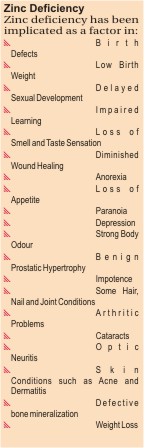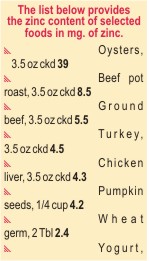|
Health
Why Zinc is Important
 Zinc is such a critical element in human health that even a small deficiency is a disaster. Zinc supplementation is a powerful therapeutic tool in managing a long list of illnesses. Zinc, an essential trace mineral, is required for the metabolic activity of 300 of the body's enzymes, and is considered essential for cell division and the synthesis of DNA and protein. These enzymes are involved with the metabolism of protein, carbohydrate, fat and alcohol. Zinc is also critical to tissue growth, wound healing, taste acuity, connective tissue growth and maintenance, immune system function, prostaglandin production, bone mineralization, proper thyroid function, blood clotting, cognitive functions, fetal growth and sperm production. Zinc is such a critical element in human health that even a small deficiency is a disaster. Zinc supplementation is a powerful therapeutic tool in managing a long list of illnesses. Zinc, an essential trace mineral, is required for the metabolic activity of 300 of the body's enzymes, and is considered essential for cell division and the synthesis of DNA and protein. These enzymes are involved with the metabolism of protein, carbohydrate, fat and alcohol. Zinc is also critical to tissue growth, wound healing, taste acuity, connective tissue growth and maintenance, immune system function, prostaglandin production, bone mineralization, proper thyroid function, blood clotting, cognitive functions, fetal growth and sperm production.
Zinc Boosts the Immune System
The significance of zinc in the body's response to infection is well known. Zinc is a component in thymic hormone which controls and facilitates the maturation of lymphocytes. Zinc also plays a role in cell division and DNA replication, thereby aiding in the production of immune system cells.
Zinc Cuts Short the Common Cold
Zinc gluconate lozenges taken at the first sign of a cold reduce duration and symptom severity according to a 1992 study. Zinc, an antiviral agent and astringent, is released into the saliva, relieving cough, nasal drainage and congestion.
 Zinc Boosts Brain Activity Zinc Boosts Brain Activity
Zinc is found in the vesicles of the mossy fiber system of the brain's hippocampus. These fibres play a role in enhancing memory and thinking skills.
Experiments have shown that accident victims who are given zinc supplements respond with improved cognitive function. Zinc is diverted to the healing tissues following injury or surgery and becomes less available for other essential functions.
Zinc Heals and Protects Skin
Zinc is essential for healthy skin. Topical zinc preparations (zinc oxide) have been used as an astringent to treat diaper rash, itching and chapped lips and skin. Zinc sulfate in a water-based solution has been used for treating acne, cold sores and burns. Remember that zinc sulfate is a salt and can be quite caustic to raw tissue in high or moderate concentrations. Internally, zinc stimulates cell division, healing, proper connective tissue formation, and increases the transport of Vitamin A from the liver to the skin, helping to protect body tissue from damage and repair any damage present.
Zinc Stimulates Taste, Smell
Zinc activates areas of the brain that receive and process information from taste and smell sensors. Its importance to appetite was first demonstrated in 1972 when researchers showed taste disorders responded to zinc supplementation.
Zinc Improves Appetite
Levels of zinc in plasma were found to influence appetite and taste preference. Insufficient zinc has been linked to anorexia, which responds well to zinc replacement treatment.
Zinc Improves Mood
Zinc abnormalities also often exist in mood disorder patients. Zinc sulfate, taken as a supplement, appears effective in reducing fatigue, mood swings and changes in appetite.
Zinc and Pre-Menstrual Syndrome
Zinc may also help in the treatment of pre-menstrual syndrome (PMS). PMS affects 50 percent of all menstruating women. There is growing evidence that a deficiency of progesterone underlies PMS. Trace amounts of zinc regulate the secretion of many hormones, including progesterone.
Early research at Baylor College of Medicine in Houston found significantly lower levels of zinc among women with PMS during the luteal phase of menstruation, the 13 days preceding menstruation. This reduction could lead to a decrease in secretions of progesterone and endorphins. Endorphins are the natural painkillers our bodies produce. While research is ongoing, it suggests that some women's PMS symptoms may be improved by zinc supplementation.
Zinc in Pregnancy and Lactation
 It is critical that a pregnant woman satisfy her body's need for zinc. The official RDI for pregnant women is 19 milligrams per day. A report in the October 1992 American Journal of Epidemiology indicated that low zinc intake was associated with approximately a two-fold increase in risk of low birth weight, and low zinc intake earlier in pregnancy was associated with more than a trebling of pre-term delivery. It is critical that a pregnant woman satisfy her body's need for zinc. The official RDI for pregnant women is 19 milligrams per day. A report in the October 1992 American Journal of Epidemiology indicated that low zinc intake was associated with approximately a two-fold increase in risk of low birth weight, and low zinc intake earlier in pregnancy was associated with more than a trebling of pre-term delivery.
Research reported in the British medical journal, The Lancet, September 1992, notes that by the sixth month of lactation even a well-nourished mother may provide less zinc than is necessary for her child. Breastfed babies who received zinc supplements grew significantly in length and weight over those given a placebo.
Zinc in Post-Menopausal Health
As a woman ages, her zinc status may decline for several reasons. Excess estrogen can lower serum zinc levels. Women using estrogen replacement therapy should check to be sure their zinc intake is adequate. A Wayne State study found that nearly 30 percent of a large group of healthy, affluent women over 50 were zinc deficient. Zinc deficiency appears to be common in older women. This may be in part because they eat less and in part because the food they consume is deficient in zinc.
It is well known that the immune system weakens with age, and zinc deficiency may be partly to blame. Zinc is needed for night vision and may also slow the progression of macular degeneration. Macular Degeneration is a disorder of the retina that is the leading cause of severe loss of vision in older women.
 Dietary Sources of Zinc Dietary Sources of Zinc
Rich sources of zinc are oysters, beef, liver, crab, seafood, poultry, nuts and seeds, whole grains, tofu, peanuts and peanut butter, legumes and milk. Zinc found in breast milk is better absorbed than that in formula milk. Fruits and vegetables are not generally good sources of zinc.
Zinc Toxicity
While a zinc deficiency is a health disaster, once the body's needs have been met, more is not better. If you take too much zinc, you may experience zinc toxicity, which may result in abdominal cramping, diarrhea and vomiting. Excessive zinc intake will eventually affect the balance and proper ratios to numerous other important nutrients that may include iron, calcium, selenium, nickel, phosphorus, copper, as well as Vitamin A, B1, C, and others.
Long term overdosing on zinc may also cause, or contribute to gastrointestinal problems, hair loss, anemia, loss of libido, impotence, prostatitis, ovarian cysts, menstrual problems, depressed immune functions, muscle spasms, sciatica, renal tubular necrosis / interstitial nephritis, dizziness and vomiting, among others.
Zinc toxicity may also (in doses > 80 mg/day) decrease levels of HDL-cholesterol and white blood cells. Impaired cholesterol metabolism may also result from excess intake of zinc supplements.
The upper limit of safety for zinc established by the Food and Nutrition Board of the Institute of Medicine is 40 milligrams daily for adults.
Zinc and Athletic Performance
Endurance athletes may develop a zinc deficiency because of dietary deficiencies and increased zinc demands and losses. A high carbohydrate diet has been used by endurance athletes in an attempt to enhance their performance. High carbohydrate diets are low in zinc. If zinc supplements are not being taken, low zinc levels are likely.
Poor appetite is one potential sign of zinc deficiency. Because zinc is involved in the growth and development of taste buds, deficiency reduces taste and a poor appetite. Zinc deficient individuals also tend to find protein disagreeable, compounding their problem. In female athletes zinc deficiency can result in menstrual cycle irregularities, amenorrhoea and osteoporosis.
Zinc deficiency in athletes can lead to anorexia, weight loss, decreased endurance, fatigue and an increased risk of osteoporosis.
Strenuous exercise may contribute to the zinc deficiency by increasing sweat loss and zinc redistribution between blood plasma and red blood cells.
Source: www.advance-health.com
Copyright (R) thedailystar.net 2006 |
